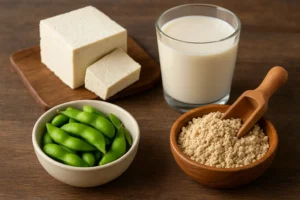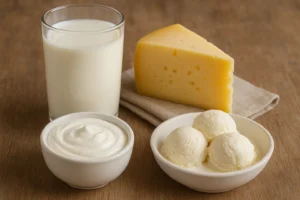What Foods Cause Melasma?

Written by Clear Skin Content Team | Medically Reviewed by Dr. Dhanraj Chavan on August 12, 2025

Are you tired of those stubborn dark patches on your skin that won’t disappear? Do you find yourself avoiding the sun, wearing layers of makeup, and trying every skincare product on the market, only to see minimal results? If so, you are dealing with melasma, a common skin condition affecting millions worldwide. But did you know certain foods could trigger them?
That’s true! Your diet could be a significant contributor to the appearance of melasma on your skin. But don’t worry; we’ve got you covered! In this article, we will discuss what food cause melasma. Keep reading!
Table Of Content
- Melasma and Food
- Food to Avoid for Melasma
- Conclusion
Melasma and Food
Melasma is a common skin condition characterised by brown or grey-brown patches on the face, particularly on the cheeks, forehead, chin, and upper lip. While the exact cause of melasma is not fully understood, several factors are believed to contribute to its development, including hormonal changes, genetics, sun exposure, and inflammation.
There is limited scientific evidence supporting a direct connection between melasma and food. However, certain foods have been suggested as potential triggers for melasma. Finally, the relationship between diet and melasma remains largely speculative and individualised. Some people may notice that certain foods or dietary patterns exacerbate their melasma, while others may not experience any significant changes.
Food to Avoid for Melasma
elasma is a skin condition often linked to hormonal changes, and while food alone isn’t the sole cause, certain dietary choices can potentially worsen it. If you’re looking for ways to manage melasma or seeking melasma treatment in Pune, understanding the role of diet can be a helpful step. Here’s a detailed look at foods that might contribute to melasma or make it harder to manage:
1. Copper-Rich Foods
Copper is essential for melanin production, the pigment responsible for skin color. However, excessive copper can disrupt melanin balance, potentially exacerbating melasma. Foods high in copper include:
- Shellfish (like oysters and crabs)
- Nuts and seeds (especially cashews, sunflower seeds)
- Dark chocolate
While these foods are nutritious, consuming them in excess might not be ideal if you’re prone to melasma.
2. High-Glycemic Index (GI) Foods
High-GI foods cause rapid spikes in blood sugar, leading to increased insulin production and inflammation. These hormonal changes can aggravate melasma. Examples of high-GI foods include:
- White bread, white rice, and pasta
- Sugary cereals
- Pastries, cakes, and cookies
- Sweetened beverages like soda and energy drinks
Switching to low-GI options like whole grains, legumes, and non-starchy vegetables can help stabilize blood sugar and reduce inflammation.
3. Sugary Foods
Excess sugar can lead to hormonal imbalances and inflammation, both of which can disrupt melanin production and worsen melasma. Foods to limit include:
- Candy and chocolate
- Desserts like ice cream and pies
- Sweetened yogurts
- Processed snacks with added sugars
Reducing sugar intake can benefit not just your skin but your overall health.
4. Soy-Based Products
Soy contains isoflavones, which mimic estrogen in the body. Since melasma is often linked to hormonal changes, consuming too much soy might exacerbate the condition. Common soy-based foods include:
- Tofu
- Soy milk
- Edamame
- Soy protein isolates (found in some protein powders and bars)
If you notice a connection between soy and your melasma, consider moderating your intake and consulting a dermatologist for melasma treatment.
5. Dairy Products
Some studies suggest that dairy, particularly skim milk, may be linked to skin issues, including melasma. The proteins in milk can affect hormonal balance, potentially triggering or worsening the condition. Dairy products to watch out for include:
- Milk (especially skim milk)
- Cheese
- Yogurt
- Ice cream
If you suspect dairy is a trigger, try reducing your intake and observe any changes in your skin.
6. Processed and Inflammatory Foods
Highly processed foods and those rich in unhealthy fats can promote inflammation, which may worsen melasma. Examples include:
- Fast food
- Fried foods
- Packaged snacks (chips, crackers)
- Foods with trans fats or hydrogenated oils
Opting for anti-inflammatory foods like fresh fruits, vegetables, and omega-3-rich options (like salmon and walnuts) can help.
What to Eat Instead?
To manage melasma, focus on a balanced diet rich in:
- Low-GI foods: Whole grains, legumes, and non-starchy vegetables
- Antioxidant-rich foods: Berries, leafy greens, and citrus fruits
- Healthy fats: Avocados, nuts, seeds, and olive oil
- Omega-3 fatty acids: Fatty fish, flaxseeds, and chia seeds
Do You Know?
Roughly 250 Patients Are Treated
Everyday By These Dermatologists
(You are one click away from flawless skin)
Meet Our Dermatologist!
Conclusion
In conclusion, while the exact connection between melasma and diet is still unclear, certain foods may exacerbate the condition for some individuals. Avoiding foods high in copper, glycemic index, sugar, soy, and dairy may help manage melasma symptoms. As responses to dietary changes can vary, it is important to consult with a dermatologist to develop a personalized plan for managing melasma.
If you are struggling with this skin condition, consider reaching out to our specialists at Clear Skin Clinic in Pune for expert advice and treatment options.
Further Reading
Pune Acne Treatment Costs – What to Expect in 2026?
Complete guide to acne treatment costs in Pune 2026. Transparent pricing for chemical peels, laser treatment, and isotretinoin at Clear Skin Clinic
Laser vs Microneedling – Best Acne Scar Treatment in Pune?
Best acne scar treatment in Pune? Compare fractional CO2 laser vs microneedling — results, cost, recovery & safety at Clear Skin Clinic Pune.
How Long Do Acne Treatments Take to Show Results in Pune?
Wondering how long acne treatment takes to show results in Pune? Explore detailed treatment plans customized by expert dermatologists for faster, clearer skin.
Can You Do Laser Hair Removal Over Tattoos?
Discover if laser hair removal is safe over tattoos. Learn how to protect your tattoo while getting rid of unwanted hair. Clear Skin offers expert advice
Have thoughts? Please let us know
We are committed not only to treating you, but also educating you.











